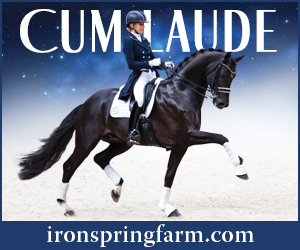Reprinted from the October 2018 USDF Connection magazine.
Early Lifetime Achievement Award recipient was a volunteer extraordinaire
Every organization has a naysayer—a Gloomy Gus who mournfully pronounces every challenge insurmountable. If the organization is lucky, Gloomy Gus is countered by a thoughtful, pragmatic problem-solver who can be relied on to come up with innovative solutions to thorny issues.
In the USDF and in his group-member organization (GMO), the California Dressage Society (CDS), for many years that strategic thinker was Peter Lert.
A native of Germany who called California home for eight decades, Lert (1921-2012) was one of those dressage supporters whose contributions to the sport far exceeded his name recognition. Although he was a dressage judge, an American Horse Shows Association (now US Equestrian) Dressage Committee member, a USDF L faculty member, and a sport-horse breeder, among others, he didn’t enjoy widespread “marquee value” outside California—although he was respected by those who worked with him on committees, studied with him, or interacted with him during his many years as a fixture at USDF conventions. Lert was venerated in his home state as a charter CDS member who served multiple terms as CDS president, vice president, and board member.
In 2003, the second year the honor was bestowed, Lert received the USDF Lifetime Achievement Award. Here’s why.
Where dressage in America was concerned, Lert got in on the ground floor. His family emigrated from Germany in 1932, when the boy was just 11. (The move was a rather glamorous one: Lert’s mother, Vicki Baum, was the author of the novel Grand Hotel, and the family came to the Golden State so Baum could work on the film adaptation. The fact that war in Europe was looming provided added incentive.)
Lert, the product of famous and well-to-do parents—besides his mother, his father was the conductor Richard Lert—had been introduced to horses and riding in Europe, and he continued his interest in America, beginning at boarding school. He joined the US Army in 1942, during World War II, going on to graduate from the US Army Cavalry School at Fort Riley, Kansas, and later teaching horsemanship there. Lert was a career military officer, serving in Europe as an intelligence officer and retiring as a colonel.
(Horses and dressage were actually not Lert’s primary professional focus. Like many retired military personnel, he went on to a “second act” career. An alumnus of the University of California, he was a farm advisor in Santa Clara County for the university system’s Division of Agriculture and Natural Resources for 32 years.)
Considering the depth of Lert’s involvement in both CDS and USDF, it’s remarkable that this man found the time to do it all. He served CDS in various roles—president, vice president, director, and technical advisor—from 1979 until his death in 2012. On the national level, he was the 1981-1982 USDF vice president and also served as the USDF Region 7 director from 1986 through 1995. A founding member of the USDF, he attended the annual conventions for nearly three decades, many times bringing his steadying presence and wise observations and suggestions to Board of Governors assemblies as a delegate.
Lert played a groundbreaking role in several USDF initiatives. In 1975, he and the late Col. Clarence Edmonds helped to develop a judge-training program for CDS. The CDS program was a forerunner to the USDF L Education Program, on which Lert served as a faculty member for many years, including teaching the very first L program session.
As a member of the USDF Historical Committee (now the Historical Recognition Committee), Lert was instrumental in developing the nomination forms and criteria for the Roemer Foundation/USDF Hall of Fame and the USDF Lifetime Achievement Award.
Another Lert first was the creation of the USDF Animal Welfare Committee. Although that committee no longer exists, Lert’s efforts live on through the USDF Statement on Animal Welfare: He wrote the original statement, and the current version appears in every prize list for a US Equestrian-licensed/USDF-recognized dressage competition.
The forward-thinking Lert also recognized that the USDF and the sport of dressage would benefit from embracing riders with physical disabilities. He initiated and chaired the USDF Competitive Dressage Riders with Disabilities Committee to serve this branch of the dressage constituency, and he successfully lobbied US Equestrian to take a similar action. Today the sport of para-equestrian dressage, as it is now known, is growing in the US, and the USDF now offers year-end awards for para-dressage riders.
At home in Los Gatos, California, Lert was a well-known breeder of Swedish Warmbloods. Two of his stallions, Laylock and Legere, were successful at the FEI levels, with top-five rankings in USDF Horse of the Year standings. In 2001, at the age of 80, Lert rode his 20-year-old homebred Legere to become the fourteenth member of The Dressage Foundation’s Century Club, for horse-rider pairs whose ages equal or exceed 100. Lert’s late wife, Bonnie, was also a rider, and their love of horses and dressage live on in their daughter, Tracey Lert, who is a dressage professional in California.
Although jumping was Lert’s first equestrian love, he will be remembered as a pioneering force in the sport of dressage, both in California and on the national level. CDS members loved to remind Lert of the one time his optimism failed him—tributes to him inevitably mentioned the fact that his 1968 charter-member CDS dues payment was accompanied by a note that read, “You’re welcome to my $10—but you’ll never get it off the ground!”—knowing full well that it was Lert’s own efforts that helped get the organization off the ground. All dressage enthusiasts in the US are forever richer for Lert’s many contributions.
The editor thanks CDS members Connie Davenport and Terry Wilson for providing archival material that served as sources for this article, and USDF Historical Recognition Committee staff liaison Victoria Trout for fact-checking some dates.
Honoring American Dressage’s Greats
Learn about the Roemer Foundation/USDF Hall of Fame members, USDF Lifetime Achievement Award recipients, and USDF Member of Distinction honorees at usdf.org/halloffame, where you’ll also find nomination forms and criteria. Nominations are due May 1 of each year.
















